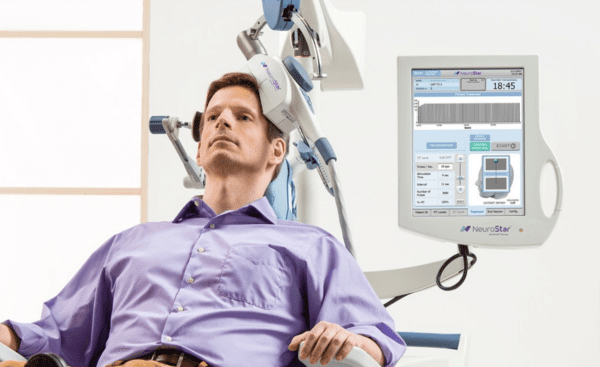

For many people with depression, a combination of counseling and medication are effective treatments of depression. Unfortunately, these treatments don’t work for everybody who is suffering from major depression.
But that doesn’t mean there’s no way out. Even if antidepressants do not work for you, there is still hope. You may qualify for TMS therapy, a form of outpatient depression therapy that is often extremely helpful when other forms of treatment prove insufficient.
You’re not alone—there are four million people per year who can’t take antidepressants for their depression. It’s not too late to hope for relief from your depression symptoms without it.
How do antidepressants work?
While the exact root cause of depression is not yet completely understood, scientists believe that it is due to decreased activity in the mood regulation centers of your brain, caused by an imbalance in the chemicals that send messages between your brain cells. The purpose of antidepressants is to correct this imbalance.
There are two major forms of antidepressants – SSRIs (for “selective serotonin reuptake inhibitors”) and SNRIs (for “serotonin and norepinephrine reuptake inhibitors”).
These two forms of antidepressants both work by preventing the neurons in your brain from reabsorbing the messenger chemicals in your brain that play a key role in regulating your mood.
Depression medicine side effects
Since most types of antidepressants are taken orally, they tend to pass through the bloodstream and throughout the body on their way to the brain, which means they have systemic side effects. Systemic side effects are side effects that affect the entire body, not just the organ targeted directly by your medication (which, in the case of antidepressants, is the brain).
As a result, the side effects of depression medication can affect your whole body. Common side effects may include feelings of agitation or anxiety, nausea and dizziness, diarrhea or constipation, fatigue, weight gain, sleep problems, or a reduced sex drive.
For many people, antidepressant side effects are common during the first few weeks of treatment and then lessen in severity or disappear entirely over time.
However, for some, the side effects of antidepressants may persist long-term. Long-term antidepressant side effects can be extremely difficult to tolerate.
Can antidepressants stop working?
While depressants work consistently for many people, for some people, antidepressants can lose their effectiveness over time and eventually stop working altogether. Some reasons why this happens are:
- Worsening depression symptoms
- Underlying medical conditions
- Interference from new medication
- Development of chemical tolerance in the body
- Brain and body chemistry changing with age
Can antidepressants make you more depressed?
Antidepressants can take up to six to eight weeks to start working while their side effects generally taper off. However, this is not always the case for everybody. For some people with treatment-resistant depression, antidepressants may generally have little or no positive effect on one’s depression symptoms, which, combined with possible long-term undesirable side effects, may further worsen one’s mood.
What to do when you can’t find an antidepressant that works
There are a wide range of antidepressants available for treating depression. For many people, if one type of antidepressant does not have enough of an effect in reducing or eliminating depression symptoms or does not work at all, you can talk to your doctor about switching to a different medication.
However, if you have tried numerous antidepressants already and have experienced little or no reduction in your depression symptoms, you might feel as though there’s nowhere else for you to turn.
You haven’t run out of options for treating your depression, though. When you can’t find an antidepressant that works and both therapy and medication have yielded little to no positive results in your treatment, you may find relief with TMS therapy.
TMS Therapy for treatment-resistant depression
TMS (transcranial magnetic stimulation) therapy is a non-invasive, non-drug, outpatient brain stimulation therapy that uses short pulses of concentrated magnetic fields to treat depression.


TMS therapy for depression applies magnetic pulses to the left prefrontal cortex of your brain—the part responsible for mood regulation. Depression, as well as many other mood disorders, are generally the result of chemical imbalances in this part of the brain. The magnetic pulses produce very small electrical currents in your brain that stimulate your brain cells to release neurotransmitters such as serotonin and “talk” to each other. Undergoing about four to six weeks of daily TMS therapy sessions “trains” your brain to produce these neurotransmitters on its own, greatly reducing or eliminating your depression symptoms.
Just like an MRI scan, TMS therapy is a generally painless procedure. There are very few side effects, mainly scalp or jaw irritation. Because it directly affects the brain instead of going through the whole body as depression medication does, there are no systemic side effects. TMS patients can get right back to their daily routine with no impairment after a session.
While there is no cure for depression, TMS therapy is an extremely effective treatment for major depression when counseling and medication have both failed to yield positive results. Roughly 4 in 5 people experience improvement in their depression symptoms for six months to a year after several weeks of TMS therapy, with 3 in 5 reporting a complete remission in symptoms.
If you have been diagnosed with major depression or an anxiety disorder, have exhausted all other possible treatments, and meet the physical criteria to receive TMS treatment, then TMS may be right for you.
TMS Central Florida is the only TMS therapy provider in the Brandon, Florida area. If you are looking for depression relief, contact us to see if you qualify for treatment, we’re always here to help.

